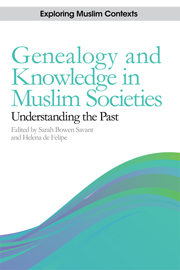Introduction
Published online by Cambridge University Press: 05 September 2014
Summary
Genealogy has long been recognised as one of the most important and authoritative organising principles in Muslim societies. Expressions of genealogy have over the course of history taken particular forms and performed important functions in Muslim societies, so many in fact that it would be impossible to describe them comprehensively. The Prophet's family tree, including his ancestors, descendants (the sayyids or sharīfs) and adoptive clients (mawālī), has provided an important paradigm, underwriting dynastic arrangements, providing access to patronage and supporting power brokers and mediators. Other patterns of kinship, including tribal lineages, descent from the Companions of the Prophet or descent from Sufi saints, have conferred similar forms of opportunity and/or prestige. Converts with family ties to other Muslims have felt a stronger sense of connection to their new faith; in the first centuries of Islam, converts even became fictively adopted into Arab tribes. Today, ideas about kinship and descent continue to shape communal and national identities in virtually every Muslim country, where they operate at the very highest levels of state and religion and where there is often a certain truth to the Arabic saying, “Nobility is genealogy. The noble in any one people shares kinship with the noble in every other people.”
As a result of the importance of genealogy, debates abound, the most enduring ones centring on the worthiness of particular ancestors, the legitimacy of prestige based on genealogy and the authenticity of different lineages as well as of the claims of individuals to belong to them. Several contradictory statements are attributed to the Prophet, ʿAli ibn Abi Talib and the earliest Muslims in support or denial of the social value of noble kinship, and these give a sense that during the first centuries Muslims could not agree on this question.
- Type
- Chapter
- Information
- Genealogy and Knowledge in Muslim SocietiesUnderstanding the Past, pp. 1 - 8Publisher: Edinburgh University PressPrint publication year: 2014



